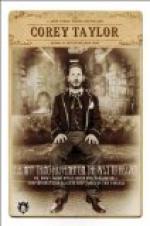With a splash the remaining water in the tea-kettle was poured in the dish-pan, and for a few moments the clatter of knives and forks and spoons prevented talk. Over the blind man’s face crept the content that comes from a good cigar, and in silence he and his guest smoked while Carmencita did her work. Not long was there silence, however, for very shortly the child was on a stool at Van Landing’s feet, in her hands a pad of paper, and on her knee a backless magazine.
For half a minute she looked in Van Landing’s face. “Isn’t it nice and funny—your being here? I like you.” Her voice was joyous. “If I tell you something, you won’t tell?” She leaned forward, hands on his knees. “This afternoon before I went out I asked God please to let something nice happen. There hasn’t anything very nice happened for so long, I was afraid He had forgot. What must I write, Mr. Van?”
Into Van Landing’s face the color surged, then died away and left it strangely white. The child’s eyes were holding his, and he did not try to avoid them. It didn’t matter. The only thing that mattered was to get Frances quickly.
“Tell her I must see her to-night, that I must come to her. Why can’t I go to her, Carmencita?”
“Because she doesn’t want anybody to come to see her that she doesn’t tell to come. She told me so herself, and I wouldn’t break her rules for a gold ring with a ruby in it. I know. I’ll tell her I’m bound to show her something to-night or I won’t sleep a wink. And you’ll be It! You can go in Father’s room, and when she comes in you will come out and say—What will you say, Mr. Van?”
“I don’t know. Perhaps I sha’n’t say anything. Sometimes one can’t.”
“I’ll look in that book I read once and see what he said, if you want me to. It was a beautiful book. It had an awful lot of love in it. I know what I’m going to write.”
For some moments she wrote laboriously on the pad, which wabbled badly on her knees, then she folded the piece of paper and, getting up, went toward the door. Van Landing followed her.
“The boy,” he said. “Will you give him this and tell him if the note is delivered to Miss Barbour personally there will be more when he comes back?” He held out his hand.
As if not seeing aright, Carmencita looked closely at what was held toward her, then up in Van Landing’s face. “You must have plenty of money, if you haven’t any friends,” she said, and in her voice was faint suspicion. “Noodles can’t have that. He’d never go anywhere for me again if he got that much.” Her hand waved his away. “When he comes back, if you’ll give him a quarter he’ll stand on his head. It’s hard and hollow, and he makes right smart standing on it and wriggling his feet.” She shook her head. “It would ruin him to give him a dollar. Please read to Father.”
Her visitor’s face flushed. Why couldn’t he remember? “Very well,” he said; “manage it your way. Tell him to hurry, will you?’”




